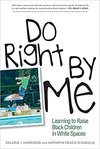For decades, Katie D’Angelo and Mt. Airy native Valerie Harrison, who both work at Temple University and both have doctorate degrees (Harrison is also a lawyer), engaged in conversations about race and racism.
This item is available in full to subscribers.
We have recently launched a new and improved website. To continue reading, you will need to either log into your subscriber account, or purchase a new subscription.
If you are a digital subscriber with an active subscription, then you already have an account here. Just reset your password if you've not yet logged in to your account on this new site.
If you are a current print subscriber, you can set up a free website account by clicking here.
Otherwise, click here to view your options for subscribing.
Please log in to continue |


The following is an expanded version of what appeared in the print edition of the Chestnut Hill Local.
For decades, Katie D’Angelo and Mt. Airy native Valerie Harrison, who both work at Temple University and both have doctorate degrees (Harrison is also a lawyer), engaged in conversations about race and racism. However, when Katie and her husband, Michael, who are white, adopted Gabriel, a bi-racial child, Katie’s conversations with Val, who is black, were no longer theoretical and academic.
Their many conversations about this sensitive topic eventually developed into a new book by both learned women, "Do Right By Me: Learning to Raise Black Children in White Spaces" (Temple University Press, November, 2020). It will be the subject of a virtual discussion on Monday, Feb 8, 7 p.m., sponsored by Big Blue Marble Bookstore, 551 W. Carpenter Lane in West Mt. Airy. The book is essentially about how to equip a black or bi-racial child with the tools that will best serve him/her as he/she grows up in a white family. Following are the questions and answers from a recent conversation by the Local with the authors:
Is 'Do Right by Me' just for white parents of black children?
“No; the book is useful not only for white adoptive parents of black children but for anyone engaged in parenting and nurturing black children, including black or interracial families of origin … Readers will learn how race impacts the way the world interacts with a black child and how they as adults can provide all black children with the knowledge and awareness to resiliently face these challenges.”
You write that 'Do Right by Me' is designed to “orient parents and other community members to the ways race and racism affect a black child’s life and despite that, how to raise and nurture healthy and happy children.” Please explain.
“My husband, Mike, and I are white, and we adopted a beautiful bi-racial boy at birth. It was clear to us that white parents of black children want to parent well but have real questions and concerns about racism, culture and identity. Unlike parents who buy into a 'color-blind' or 'post-racial' ideology, Mike and I had to confront head-on the reality that we would need to equip our bi-racial son for an experience far more complex than anything we had experienced … Val has a doctorate in African American studies and lived experiences as a black woman. Each chapter includes a story from our personal experience supported by research and offers practical tips to put ideas into action.”
How important are cross-racial relationships to a better understanding of what’s happening in America now?
“We have worked together at Temple University for almost 20 years. What began as a professional relationship grew into a close friendship … Essential to the task is an understanding of racism and how systems continue to perpetuate privileges and disadvantages that black people have to navigate in ways that white people may never have had to. The safety and security of a 20-year friendship allowed us to have that difficult conversation.”
You write about the importance of developing a positive racial identity. Can you describe some of the pitfalls to avoid as you encourage readers to navigate the racism that is entrenched in American society?
“News reports exaggerate negative portrayals of black people, overrepresenting them in stories about poverty and crime and underrepresenting them in positive stories about their leadership, community involvement and family life. Shielding black children from negative and imbalanced messages while saturating them with positive and balanced counterimages has been found to be effective in building positive black identity and self-esteem while reducing the negative impact of racism on identity development.”
Katie, you explain in the book that your worldview and cultural paradigm shifted after Gabriel. Can you talk about that?
Katie: “I was operating within a different cultural paradigm that was more Eurocentric and imposed upon its participants a notion that you are only good enough ... if you measure up to a predetermined set of standards, largely informed and dictated by the white people who designed them. And one that judged others as inferior in order to feel superior … The mindset I inherited certainly wasn’t doing me any good, and my desire to shift gears brought me the greatest gift of my life.”
“Do Right by Me” includes info on “The Talk.” What observations (and optimism) do you have about social change and awareness?
Katie: “The murder of George Floyd may finally dispel the myth that we are living in a post-racial America. It is only now as a mother that I understand how very different it all was for me because of the color of my skin. My husband and I understand that our decisions and behaviors that were read as assertive or a normal testing of boundaries may be read as disorderly, defiant or even threatening if we were not white. Our world does not give our son the privilege of acting like us, and it places the burden unfairly on him to manage how others feel about him.”
Ed. note: Valerie Harrison grew up in Mt. Airy. Her formal pursuit of knowledge includes earning a bachelor’s degree in economics from the University of Virginia, a juris doctorate from Villanova University School of Law and a master’s degree in liberal arts and a doctor of philosophy degree in African-American Studies, both from Temple University. As an attorney, Valerie enjoyed both a corporate legal career and a church-based legal ministry. She came to Temple University as a member of its in-house legal team and now serves as senior advisor to Temple’s president, leading the initiative to strengthen the university’s efforts around diversity, equity and inclusion. Valerie also served as general counsel at Arcadia University and Lincoln University, and as acting president at Lincoln during the 2014-2015 academic year.
Kathryn Peach D’Angelo (“Katie”) grew up in Maryland and came to Philadelphia in 1990 to attend St. Joseph’s University, then never really left. After earning a bachelor’s degree in English and a master’s degree in organizational development from St. Joe’s, Katie transitioned from working for the Archdiocesan Office for Youth and Young Adults to Temple University. At Temple Katie has served as associate dean of students, a project director for the Provost and for the past decade as the assistant vice president for administration and planning. While working at Temple, Katie earned a doctorate in education.
For more information, visit bigbluemarblebooks.com or call 215-844-1870. Len Lear can be reached at lenlear@chestnuthilllocal.com.